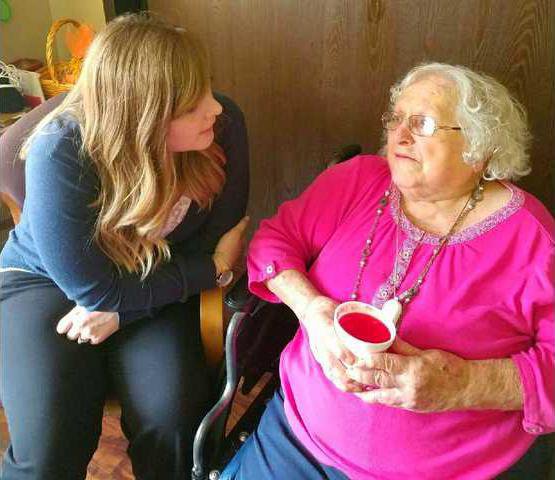When Brianna Saryerwinnie is treating a Cherry Village Benevolence resident who has a swallowing disorder, she focuses on safety, nutrition and overall quality of life.
Saryerwinnie is the speech/language pathologist (SLP) at the non-profit Cherry Village, a long- and short-term-care facility at 1401 Cherry Lane. She wanted to share information now about swallowing problems because May is Stroke Awareness Month.
“Stroke is one of the more common causes of swallowing disorders,” Saryerwinnie said. “Others include traumatic brain injury, dementia and overall weakness.
“In a large majority of cases, we can at least alleviate the problem and oftentimes we can overcome it,” she added.
The medical term for a swallowing disorder is dysphagia. Common symptoms include: clearing the throat at mealtime; coughing while eating and/or drinking; difficulty chewing; food getting stuck; pocketing food in cheeks; and poor-fitting dentures.
“When a symptom occurs, we want to act quickly,” Saryerwinnie noted. “Dysphagia can lead to choking or the aspiration of food into the lungs. This can lead to aspiration pneumonia, which can be fatal.”
In most cases, a physician recommends a Modified Barium Swallow Study (MBSS) or a Fiberoptic Endoscopic Evaluation of Swallow (FEES).
Saryerwinine performs the MBSS at Great Bend Regional Hospital. An SLP from Kansas City performs the FEES at Russell Regional Hospital; Saryerwinnie is also present.
“In either case,” she said, “I am with my patient. The procedures do not take much time and we can have the results right away. We then know what type of diet is best and we can start treatment immediately.”
Several options are available. Regular, soft and pureed diets are possibilities, along with a variety of liquid diets.
In addition, Saryerwinnie may suggest tucking the chin down while swallowing or tilting the head to allow food to go down easier. Mouth and throat exercises can help with strength and coordination.
“Sometimes we suggest taking smaller bites, slowing down at the dinner table and alternating food and drink,” she pointed out. “I work with the caring dietary department at Cherry Village and suggest various food textures and consistencies.
“The nursing staff here is great about determining which residents could use help with swallowing.”
When a resident comes to Saryerwinnie’s attention, she may suggest a screening. Then, if necessary, she will seek a doctor’s order for further evaluation and treatment.
“The bottom line is we will do everything we can to help with this problem,” Saryerwinnie said. “We want our residents to be safe and get the proper nutrition, while enjoying an enhanced quality of life.
“Better nutrition means better overall health,” she continued. “Meals are something we all look forward to. Our goal is to ensure our residents enjoy their food and the socializing that comes with sharing a meal.”
A local family has managed Cherry Village since it opened in 1978. It is a non-profit facility.





